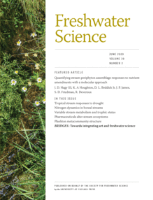
Freshwater Science
Scope & Guideline
Connecting Researchers for a Thriving Aquatic Future
Introduction
Aims and Scopes
- Freshwater Ecosystem Dynamics:
Research on the interactions and dynamics within freshwater ecosystems, including the roles of biotic and abiotic factors in shaping community structures. - Bioassessment and Ecological Integrity:
Development and application of biological assessment tools and indices aimed at evaluating the health and integrity of freshwater systems. - Hydrology and Water Quality:
Studies that investigate the hydrological processes affecting water quality, including the influence of land use, climate change, and anthropogenic impacts. - Biodiversity and Conservation:
Research focused on the biodiversity of freshwater organisms, their habitat requirements, and conservation strategies for threatened species. - Microbial and Nutrient Processes:
Exploration of microbial processes in freshwater systems and their roles in nutrient cycling, including the effects of nutrient limitation and pollution. - Community Ecology and Dynamics:
Investigations into the community structure of freshwater organisms, including macroinvertebrates, fish, and algae, and their responses to environmental changes.
Trending and Emerging
- Impact of Climate Change on Freshwater Ecosystems:
Increasing research on how climate change affects hydrological regimes and ecosystem health, including temperature effects on biodiversity and metabolic processes. - Urban Stream Ecology and Restoration:
A growing focus on the impacts of urbanization on freshwater systems, emphasizing innovative restoration strategies and the role of community engagement in addressing urban stream challenges. - Microplastics and Freshwater Health:
An emerging theme centered around the effects of microplastics on freshwater ecosystems, including their interactions with biota and implications for food webs. - Environmental DNA (eDNA) Applications:
Rising interest in the use of eDNA for biodiversity assessments and monitoring of aquatic species, particularly in the context of conservation and management. - Integrating Social Science in Freshwater Research:
An increasing trend towards interdisciplinary approaches that incorporate social science perspectives into freshwater research, addressing the socio-economic aspects of water management and conservation.
Declining or Waning
- Traditional Pollution Studies:
Research specifically focused on traditional pollutants (e.g., heavy metals, conventional contaminants) has seen a decline as attention shifts towards emerging pollutants and their ecological impacts. - Static Models of Ecosystem Functioning:
There has been a noticeable decrease in studies using static models of ecosystem processes, with a shift toward dynamic modeling approaches that account for temporal variability. - Historical Ecology Approaches:
While historical perspectives remain important, the frequency of studies focused solely on historical ecology has diminished, possibly due to a growing emphasis on contemporary ecological interactions and restoration.
Similar Journals

MARINE AND FRESHWATER RESEARCH
Pioneering insights into aquatic ecology and sustainability.Marine and Freshwater Research is a prestigious journal published by CSIRO PUBLISHING that serves as a key platform for the dissemination of cutting-edge research in the fields of Aquatic Science, Ecology, and Oceanography. With an impactful presence since its inception in 1948, the journal provides critical insights into the dynamics of freshwater and marine ecosystems, promoting interdisciplinary approaches that contribute to our understanding of biodiversity and sustainability. Currently ranked in the Q2 category across major scientific domains, including Ecology and Aquatic Science, it enjoys a robust academic reputation supported by impressive Scopus rankings, such as Rank #66/247 in Aquatic Science and Rank #44/145 in Oceanography, reflecting its high citation impact and relevance. While offering a subscription-based access model, the journal remains dedicated to fostering dialogue and innovation within the scientific community, aiming to bridge the gap between research findings and practical applications in environmental management. Located in Australia, Marine and Freshwater Research is an essential resource for researchers, professionals, and students dedicated to exploring the complexities of aquatic ecosystems and advocating for their preservation.

Inland Waters
Innovating Research for a Sustainable Aquatic FutureInland Waters, published by TAYLOR & FRANCIS LTD, stands as a prestigious scholarly journal dedicated to the critical examination of freshwater ecosystems and their management. With an ISSN of 2044-2041 and an E-ISSN of 2044-205X, this journal boasts a remarkable Q1 ranking in both Aquatic Science and Water Science and Technology for 2023, reflecting its significant impact in the field. Researchers and professionals can benefit from its comprehensive coverage of cutting-edge research, methodological advancements, and policy implications concerning inland waters. Committed to disseminating valuable knowledge in a vital area of environmental science, Inland Waters aims to foster collaboration and promote innovative solutions for sustainable water management practices. As it continues through its converged years from 2012 to 2024, the journal remains an essential resource for those dedicated to advancing our understanding and stewardship of freshwater environments worldwide.
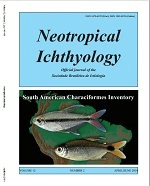
Neotropical Ichthyology
Fostering collaboration for the conservation of Neotropical fish.Neotropical Ichthyology is a prestigious open-access journal published by the SOC BRASILEIRA ICTIOLOGIA, dedicated to advancing the field of ichthyology within the Neotropical region. Since its inception in 2003, the journal has provided a vital platform for researchers, professionals, and students to disseminate significant findings related to fish biology, ecology, and conservation. With an impact factor that is reflected in its impressive Q1 ranking in Animal Science and Zoology and Q2 rankings in both Aquatic Science and Ecology, Evolution, Behavior and Systematics, it stands as a leading resource for cutting-edge research. Located in Brazil, at the UNIV SAO PAULO, the journal not only contributes to scientific knowledge but also fosters collaboration among ichthyologists dedicated to the rich aquatic biodiversity of the Neotropical region, ensuring that critical insights into fish species, habitats, and conservation strategies are accessible to a global audience.
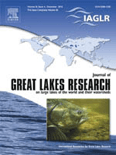
JOURNAL OF GREAT LAKES RESEARCH
Innovating Research for Sustainable Aquatic FuturesJOURNAL OF GREAT LAKES RESEARCH is a prestigious academic journal published by Elsevier Science Ltd, focused on the vital field of aquatic sciences and ecology. With a long-standing history since its inception in 1975, this journal proudly ranks in the Q1 quartile across multiple categories, including Aquatic Science and Ecology, as of 2023, reflecting its significant contribution to the scientific community. The journal's impact is underscored by its impressive Scopus rankings, placing it within the top percentile of scholarly publications in related disciplines. Although it operates under a subscription model, its influence extends globally, serving as a critical resource for researchers and professionals dedicated to understanding the Great Lakes ecosystem and its broader ecological implications. As it converges into its future publications through 2024, JOURNAL OF GREAT LAKES RESEARCH remains an essential platform for innovative research that shapes environmental policy and promotes sustainable practices in aquatic environments.
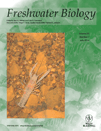
FRESHWATER BIOLOGY
Fostering Innovation in Aquatic ResearchFreshwater Biology is a premier academic journal dedicated to advancing the study of freshwater ecosystems and their biological diversity. Published by Wiley, this highly esteemed journal features an impact factor that reflects its influence within the field of aquatic science, maintaining a distinguished Q1 rank as per the 2023 standards. The journal is recognized for its comprehensive coverage of original research articles, review papers, and methodological advancements that address a range of topics from ecological interactions to conservation strategies in freshwater environments. With its extensive archive dating from 1971 to 2024, Freshwater Biology serves as an invaluable resource for researchers, professionals, and students looking to deepen their understanding of aquatic systems. Though it does not currently offer Open Access options, readers can access vital findings and contribute to the ongoing discourse in this critical area of study. Based in the United Kingdom, with its commitment to rigorous peer-review and high publication standards, Freshwater Biology continues to be a cornerstone publication in the field, enhancing our understanding of freshwater ecosystems and their management.

LIMNOLOGY
Elevating Insights into Aquatic EcosystemsLIMNOLOGY, published by SPRINGER JAPAN KK, serves as a premier platform for the dissemination of high-quality research in the fields of aquatic science, ecology, and water science and technology. With an ISSN of 1439-8621 and an E-ISSN of 1439-863X, this respected journal has consistently maintained a Q2 ranking in its respective categories as of 2023, reflecting its impact and relevance in the academic community. Operating from its base in Tokyo, Japan, LIMNOLOGY engages a diverse audience of researchers, professionals, and students who are focused on advancing knowledge related to freshwater systems and their ecological health. This journal covers a wide range of topics within its scope from the year 2000 to 2024, highlighting essential studies that contribute to both theoretical and applied aspects of limnology. Although this journal is not open access, its rigorous peer-reviewed articles are crucial for driving innovation and fostering dialogue among scientists and environmentalists dedicated to understanding and preserving water ecosystems.

INTERNATIONAL REVIEW OF HYDROBIOLOGY
Pioneering Insights in Hydrobiology and EcologyINTERNATIONAL REVIEW OF HYDROBIOLOGY is a prestigious academic journal dedicated to the dynamic fields of Aquatic Science and Ecology, Evolution, Behavior, and Systematics. Published by a reputable German publisher, this open-access journal ensures that groundbreaking research is readily available to a global audience, fostering collaboration and innovation within the scientific community. With an impressive impact factor and classification within the Q2 category of both Aquatic Science and Ecology, it ranks notably high on Scopus, standing at 211 out of 721 in Ecology and 84 out of 247 in Aquatic Science as of 2023. Covering a broad scope from fundamental hydrobiological research to applied ecological studies, the journal plays a crucial role in advancing knowledge and addressing contemporary environmental challenges. Researchers, professionals, and students will find INTERNATIONAL REVIEW OF HYDROBIOLOGY to be an essential resource for informing their own work and contributing to the global dialogue on aquatic systems and their conservation.
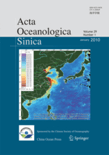
ACTA OCEANOLOGICA SINICA
Bridging Research and Marine ConservationACTA OCEANOLOGICA SINICA, published by SPRINGER, stands as a significant voice in the fields of Aquatic Science and Oceanography, contributing vital research and insights since its inception in 1985. With an ISSN of 0253-505X and an E-ISSN of 1869-1099, this journal maintains a strong international focus, delivering high-quality peer-reviewed articles that address pressing marine and freshwater environmental issues. Although it operates under a subscription model, its Q3 ranking in both Aquatic Science and Oceanography demonstrates its solid standing within Scopus, placing it in the 48th and 44th percentiles respectively. The journal aims to foster knowledge exchange and collaboration among researchers, professionals, and students by providing a platform for innovative studies and comprehensive reviews. With a dedicated editorial board and a commitment to advancing scientific understanding, ACTA OCEANOLOGICA SINICA serves as an essential resource for anyone engaged in the study of oceanographic phenomena and aquatic ecosystems.
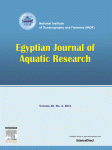
Egyptian Journal of Aquatic Research
Fostering collaboration in the realm of aquatic sciences.Welcome to the Egyptian Journal of Aquatic Research, a premier peer-reviewed academic journal published by ELSEVIER, dedicated to advancing the field of aquatic sciences. With a robust impact factor and recognition as a Q1 journal in key categories such as Aquatic Science and Ecology, this open access journal has established itself as a vital platform for disseminating high-quality research since its inception in 2012. The journal aims to provide comprehensive coverage of topics including ecology, evolutionary biology, and water science, making it a crucial resource for researchers, professionals, and students engaged in these dynamic fields. With Scopus rankings placing it in the top echelons of various categories, the Egyptian Journal of Aquatic Research fosters innovation, collaboration, and knowledge dissemination on a global scale, making it an indispensable asset for anyone invested in understanding and preserving aquatic systems.

BOLETIM DO INSTITUTO DE PESCA
Connecting researchers for impactful aquatic discoveries.BOLETIM DO INSTITUTO DE PESCA, published by the Instituto Pesca, is a Brazilian journal dedicated to advancing the fields of Animal Science and Aquatic Science. With its Open Access policy adopted in 2008, the journal ensures that research is widely disseminated, fostering collaboration and innovation among researchers, professionals, and students alike. Despite its recent Q4 category rankings in the 2023 metrics for both disciplines, the journal plays a vital role in providing a platform for emerging studies and critical discussions related to aquatic ecosystems and fisheries management. Covering a wide range of topics within its scope, BOLETIM DO INSTITUTO DE PESCA publishes original research, reviews, and case studies, stimulating academic dialogue and contributing to the sustainable management of aquatic resources in Brazil and beyond. This journal is an essential resource for anyone invested in marine and freshwater biology, ecology, and conservation.